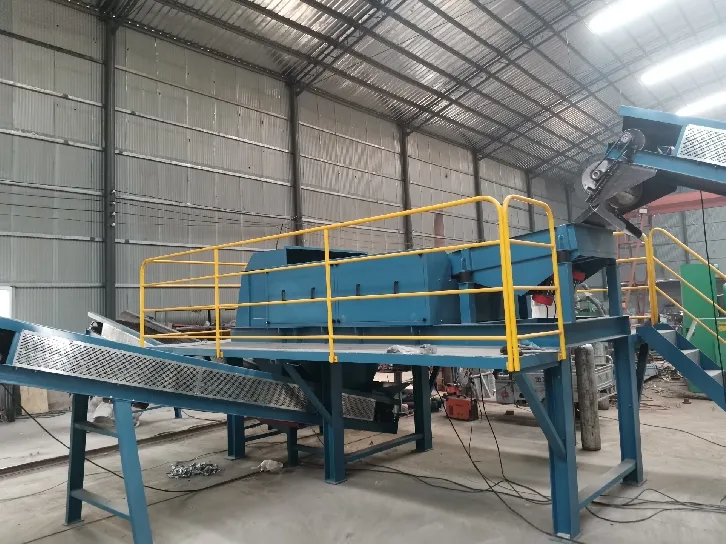

oct. . 19, 2024 15:20 Back to list
Shredder Metal Recycling A Sustainable Solution for Salvaging Metal Waste
In an increasingly resource-conscious world, the importance of recycling has gained paramount attention, especially in the context of metal recycling. One innovative approach that has emerged in recent years is shredder metal recycling, a vital process that plays a significant role in recovering valuable materials while reducing environmental impact.
Shredder metal recycling begins with the collection of scrap metal from various sources—everything from discarded vehicles to manufacturing waste. Once collected, these metals are transported to shredding facilities where mechanical shredders operate. These powerful machines break down the scrap metal into smaller, more manageable pieces, making it easier to sort and process. Shredding not only reduces the volume of waste but also prepares it for further processing, ensuring that recyclable materials can be efficiently recovered.
The benefits of shredder metal recycling extend beyond mere waste reduction. One of the most significant advantages is the ability to reclaim high-quality metals that can be reused in manufacturing processes. Metals such as aluminum, copper, and steel are highly sought after due to their inherent properties—durability, conductivity, and lightweight nature. By recycling these materials instead of extracting virgin ores, industries can dramatically reduce their carbon footprint. Additionally, the energy savings associated with recycling metals are substantial. For example, recycling aluminum saves up to 95% of the energy required to produce new aluminum from raw materials.
Moreover, shredder metal recycling contributes to the circular economy, an economic system aimed at eliminating waste and promoting continuous resource reuse. In a circular economy, products are designed for durability, repairability, and recyclability, ensuring that valuable materials are kept in use for as long as possible. Shredder metal recycling aligns perfectly with this model, transforming what would be waste into valuable resources once more. Companies engaged in this practice not only contribute to environmental sustainability but also gain a competitive edge by creating new revenue streams from recycled materials.

Community engagement plays a crucial role in the success of shredder metal recycling. Many businesses and organizations conduct awareness campaigns to educate the public about the importance of recycling metal waste. There are also various initiatives encouraging individuals to recycle their scrap metal, offering incentives such as cash for old vehicles or appliances. Such programs can foster a culture of sustainability, leading to a more significant collection of recyclable materials and the preservation of natural resources.
Despite its benefits, shredder metal recycling also faces several challenges. One of the primary obstacles is the contamination of scrap metals. Non-metal materials, such as plastics or rubber components, can complicate the recycling process, leading to increased costs and reduced efficiency. Therefore, maintaining strict quality control measures and educating the workforce about proper sorting and handling procedures is essential.
Furthermore, fluctuations in global metal prices can impact the profitability of recycling operations. When prices are low, some facilities may find it economically challenging to operate, leading to increased waste and lower recycling rates. To mitigate these risks, businesses in the recycling sector must adopt innovative strategies, such as diversifying their services or forming partnerships with manufacturers to secure a steady supply of scrap metal.
In conclusion, shredder metal recycling is a critical component of the modern waste management landscape, providing a sustainable solution for repurposing metal waste. By capitalizing on the inherent value of scrap metals, this process not only conserves natural resources but also aids in reducing greenhouse gas emissions through energy savings. As society continues to move towards a more sustainable future, the role of shredder metal recycling will undoubtedly grow, emphasizing the need for continued innovation, community engagement, and industry collaboration. Ultimately, investing in these recycling practices is not just an environmental imperative, but an economic opportunity that promotes a healthier planet for future generations.
Latest news
Troubleshooting Common Eddy Separator Problems
NewsJul.04,2025
The Role of Metal Recycling Plants in Circular Economy
NewsJul.04,2025
The Impact of Recycling Line Pickers on Waste Management Costs
NewsJul.04,2025
Safety Features Every Metal Shredder Should Have
NewsJul.04,2025
How Industrial Shredders Improve Waste Management Systems
NewsJul.04,2025
How Cable Granulators Contribute to Sustainable Recycling
NewsJul.04,2025